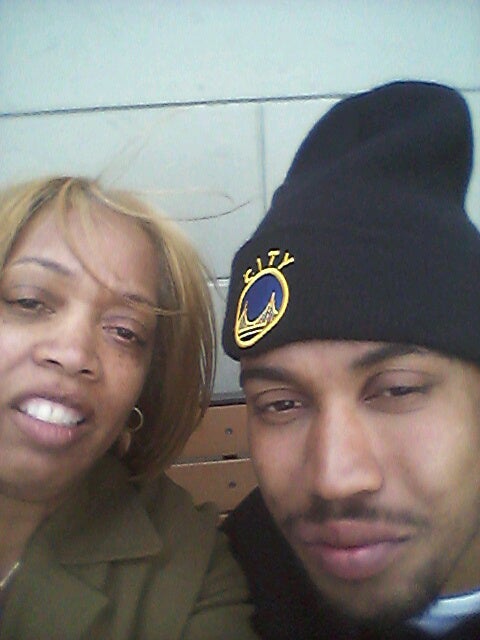
Gwendolyn Woods was on her way home from work the evening of December 2 when she noticed that her normal highway exit in her hometown of San Francisco was cordoned off. Based on friends’ Facebook posts, she concluded that police officers had shot and killed an unidentified Black man along her neighborhood’s main drag.
Hours later, a video of the shooting began circulating on social media. The minute Gwendolyn pressed play, she knew that she was witnessing her son’s final moments.
“I opened up the Facebook video to see this young man walking down the street,” the 54-year-old mother said. “I knew automatically that that was Mario. I knew his walk. I knew his stance. I opened up that video to my child being shot down.”
That was how she found out that her son had been killed by San Francisco police.
Mario Woods, 26, was walking through his Bayview neighborhood earlier that afternoon when he was approached by five officers claiming that he was a suspect in a nearby nonfatal stabbing. Police reports claim that Mario was brandishing a knife, which he allegedly refused to drop, despite officers threatening him with pepper spray and bean bags. Witness video shows Mario walking away from police when five officers opened fire, fatally wounding him.
Seven weeks have passed, and Gwendolyn wants justice. She has filed a civil rights lawsuit and is urging federal investigators to conduct a probe into the shooting. All five officers involved have returned to duty.
What happened after you watched the Facebook video?
Gwendolyn Woods: I called my niece, and I said, ‘Can you open up your Facebook and tell me if that’s your cousin?’ She called me back, and she said, ‘That’s him.’
I went to the Bayview Police Station and was told that there was no information that they could give me. I went to San Francisco General Hospital, but the woman there said that DOAs went straight to 850 Bryant, which is the main police department of San Francisco. I went there, and they shut me off.
At this point, the only thing I could think to do was go to the spot where this young person, who I wasn’t claiming at this point, was shot. When I got there, there was a group of Black Lives Matter activists. I said, ‘Do you happen to have a name for the person that was murdered here?’ They said, ‘We don’t. Do you know know?’ I said, ‘I believe it may be my child.’
At this point, an activist came to the forefront and made a couple of calls. It was then—about 12:30 a.m.—that several investigators came out. That was my confirmation that it was my child.
Adante Pointer, attorney: It’s obviously very hard for any parent or any person to deal with this idea that something bad happened to your child. You find out about it on Facebook by looking at a video, and then you’re holding on to that ray of hope that it’s not your child, but you can’t get any confirmation. [Gwendolyn] went down to the hospital, and they wouldn’t give her any information. She went down to the police department, they wouldn’t give her any information. She was simply being shooed away.
How have you and your family been coping?
Woods: I don’t know how to answer that. Being a Black mother in our community is like standing around this wheel. You spin it, and sometimes it’ll land on having to work a second job or having to work certain hours to make ends meet, and we’re good with that. It lands on all these things, but there are things you never want it to land on, like losing a child.
With the Michael Brown case, I didn’t know what to tell my sons. I say to my sons, ‘You come from Black kings and thus the fear of the black man.’ What more could I say? What more can we say to our young Black men?
Pointer: One of the many tragedies of this story is that Mario had some rough patches in his life, but he was back and essentially reintegrating into society. He had gotten a job—the uniform and the letter welcoming him into the working world had just come. And then you have this senseless, unnecessary tragedy. All that momentum, all the things that had started going in his favor, all the plans that God had for him just got wiped away.
What has the climate been like between the community and the city of San Francisco since the shooting?
Woods: One thing that I’ve come to really notice is that there’s strength in numbers. There’s the Mario Woods Coalition, Black Lives Matter has been so, so supportive, etc… I think of the night that I had to go back to the spot where this occurred, and it was a Black Lives Matter group that was there. They didn’t even know who my son was, but they were there praying and laying candles. [Earlier this month], the predominately Black and Hispanic neighborhoods met up and broke bread. If we come together in numbers, in solidarity, there’s a rude awakening for [the city[. I can be a voice.
As a mother who has been put in this unthinkable situation, what would you like people to know?
Woods: We shouldn’t have to live our lives feeling like we’re spinning this wheel. And the thing is, when we commit Black-on-Black crime, we don’t agree with that. We fight against that. When our people get sentence and go to prison, that’s what they have to do. You’re found guilty, you go do your time.
It should be no different for the police. If you callously and recklessly take someone’s life, you should [do your time], just like the rest of the people who break the law. Why is it that they feel they can take our lives like it’s nothing?